Information Systems: A Review of Knowledge Management Conferences
VerifiedAdded on 2023/06/03
|14
|2317
|329
Report
AI Summary
This report provides a comprehensive review of three international conferences focused on knowledge management within information systems. The first conference, ICKMKT 2018, explored the use of knowledge management and visualization to improve hospital workflows, utilizing the SECI spiral model. The second conference, ECKM 2017, addressed retaining knowledge in organizational structures, employing the Explanatory Model and Social Exchange Theory. The third conference, KM Conference 2017, investigated incentives for prosumers to engage in knowledge sharing, with a focus on Polish and UK-based individuals. The report synthesizes the key discussions, research methodologies, and future directions presented at each conference, highlighting the evolving landscape of knowledge management in various organizational contexts. Desklib offers this and other solved assignments to aid students in their academic pursuits.
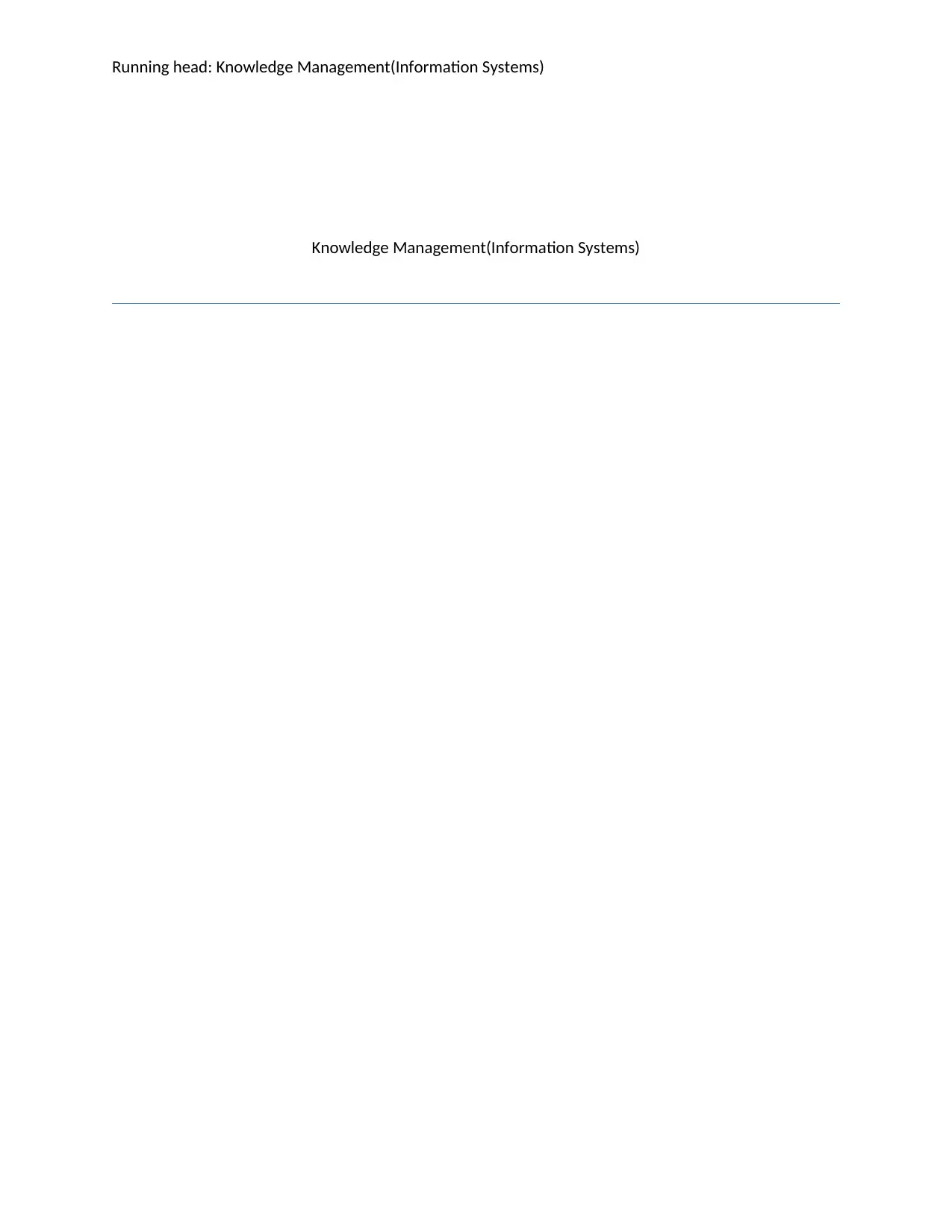
Running head: Knowledge Management(Information Systems)
Knowledge Management(Information Systems)
Knowledge Management(Information Systems)
Paraphrase This Document
Need a fresh take? Get an instant paraphrase of this document with our AI Paraphraser

Knowledge Management(Information Systems) 1
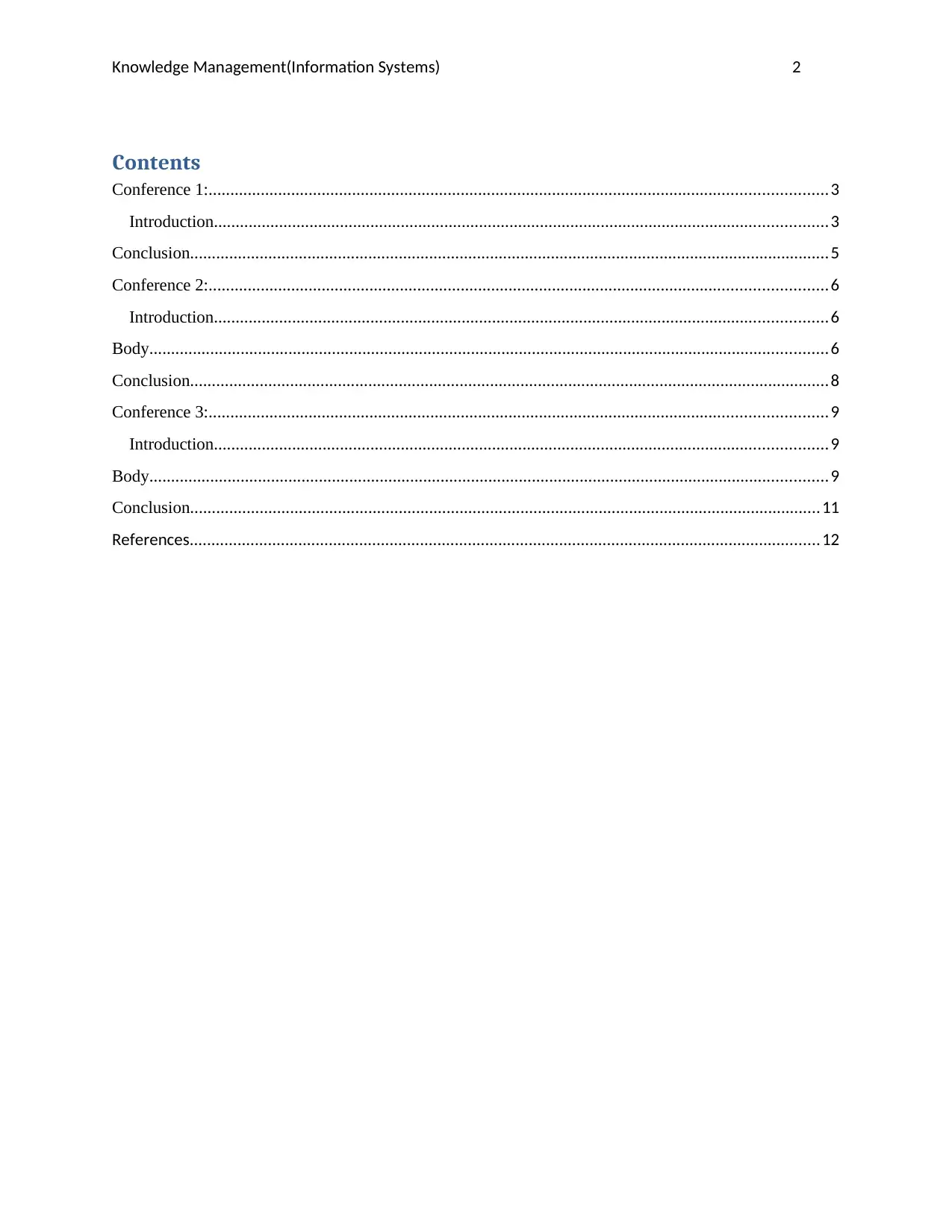
Knowledge Management(Information Systems) 2
Contents
Conference 1:..............................................................................................................................................3
Introduction.............................................................................................................................................3
Conclusion...................................................................................................................................................5
Conference 2:..............................................................................................................................................6
Introduction.............................................................................................................................................6
Body............................................................................................................................................................6
Conclusion...................................................................................................................................................8
Conference 3:..............................................................................................................................................9
Introduction.............................................................................................................................................9
Body............................................................................................................................................................9
Conclusion.................................................................................................................................................11
References.................................................................................................................................................12
Contents
Conference 1:..............................................................................................................................................3
Introduction.............................................................................................................................................3
Conclusion...................................................................................................................................................5
Conference 2:..............................................................................................................................................6
Introduction.............................................................................................................................................6
Body............................................................................................................................................................6
Conclusion...................................................................................................................................................8
Conference 3:..............................................................................................................................................9
Introduction.............................................................................................................................................9
Body............................................................................................................................................................9
Conclusion.................................................................................................................................................11
References.................................................................................................................................................12
⊘ This is a preview!⊘
Do you want full access?
Subscribe today to unlock all pages.

Trusted by 1+ million students worldwide
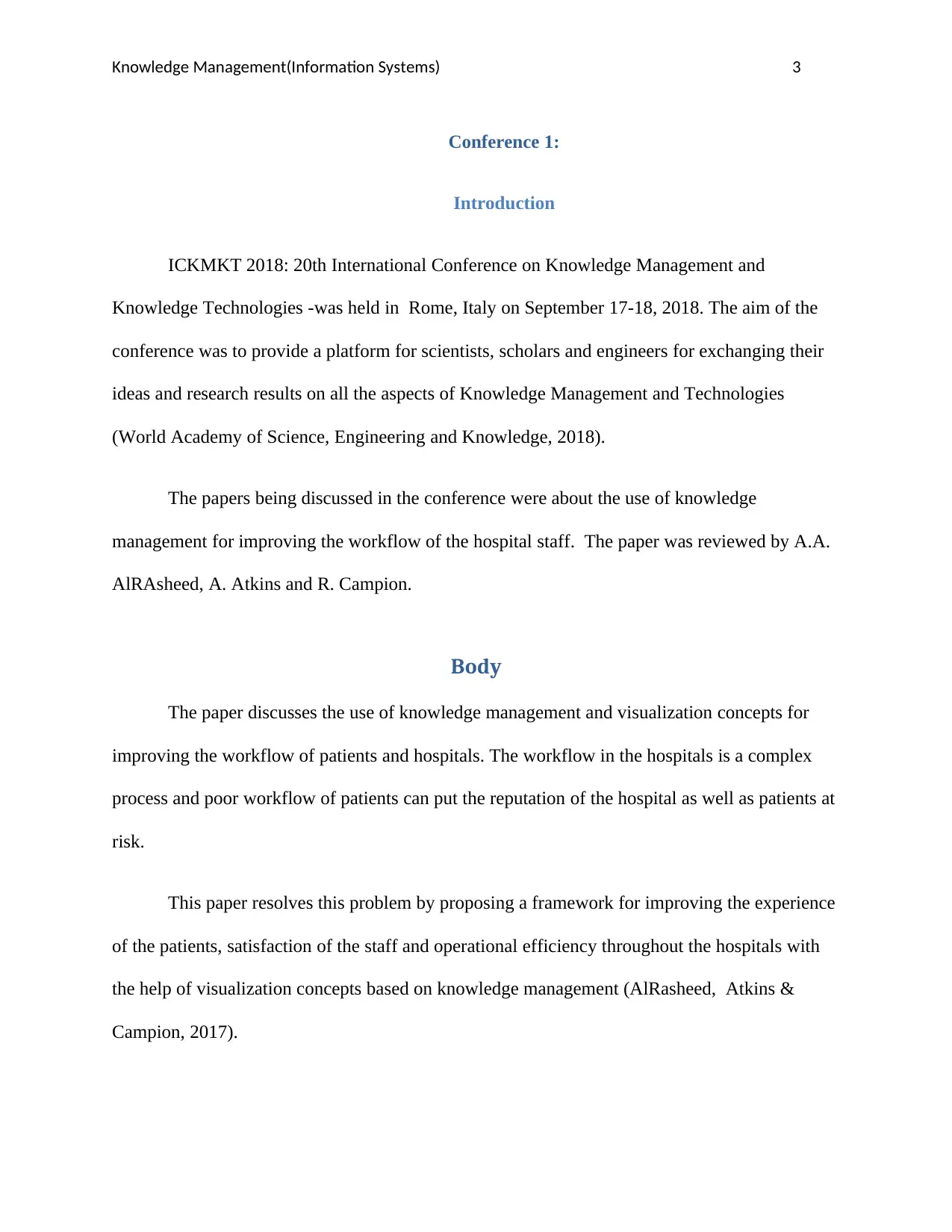
Knowledge Management(Information Systems) 3
Conference 1:
Introduction
ICKMKT 2018: 20th International Conference on Knowledge Management and
Knowledge Technologies -was held in Rome, Italy on September 17-18, 2018. The aim of the
conference was to provide a platform for scientists, scholars and engineers for exchanging their
ideas and research results on all the aspects of Knowledge Management and Technologies
(World Academy of Science, Engineering and Knowledge, 2018).
The papers being discussed in the conference were about the use of knowledge
management for improving the workflow of the hospital staff. The paper was reviewed by A.A.
AlRAsheed, A. Atkins and R. Campion.
Body
The paper discusses the use of knowledge management and visualization concepts for
improving the workflow of patients and hospitals. The workflow in the hospitals is a complex
process and poor workflow of patients can put the reputation of the hospital as well as patients at
risk.
This paper resolves this problem by proposing a framework for improving the experience
of the patients, satisfaction of the staff and operational efficiency throughout the hospitals with
the help of visualization concepts based on knowledge management (AlRasheed, Atkins &
Campion, 2017).
Conference 1:
Introduction
ICKMKT 2018: 20th International Conference on Knowledge Management and
Knowledge Technologies -was held in Rome, Italy on September 17-18, 2018. The aim of the
conference was to provide a platform for scientists, scholars and engineers for exchanging their
ideas and research results on all the aspects of Knowledge Management and Technologies
(World Academy of Science, Engineering and Knowledge, 2018).
The papers being discussed in the conference were about the use of knowledge
management for improving the workflow of the hospital staff. The paper was reviewed by A.A.
AlRAsheed, A. Atkins and R. Campion.
Body
The paper discusses the use of knowledge management and visualization concepts for
improving the workflow of patients and hospitals. The workflow in the hospitals is a complex
process and poor workflow of patients can put the reputation of the hospital as well as patients at
risk.
This paper resolves this problem by proposing a framework for improving the experience
of the patients, satisfaction of the staff and operational efficiency throughout the hospitals with
the help of visualization concepts based on knowledge management (AlRasheed, Atkins &
Campion, 2017).
Paraphrase This Document
Need a fresh take? Get an instant paraphrase of this document with our AI Paraphraser
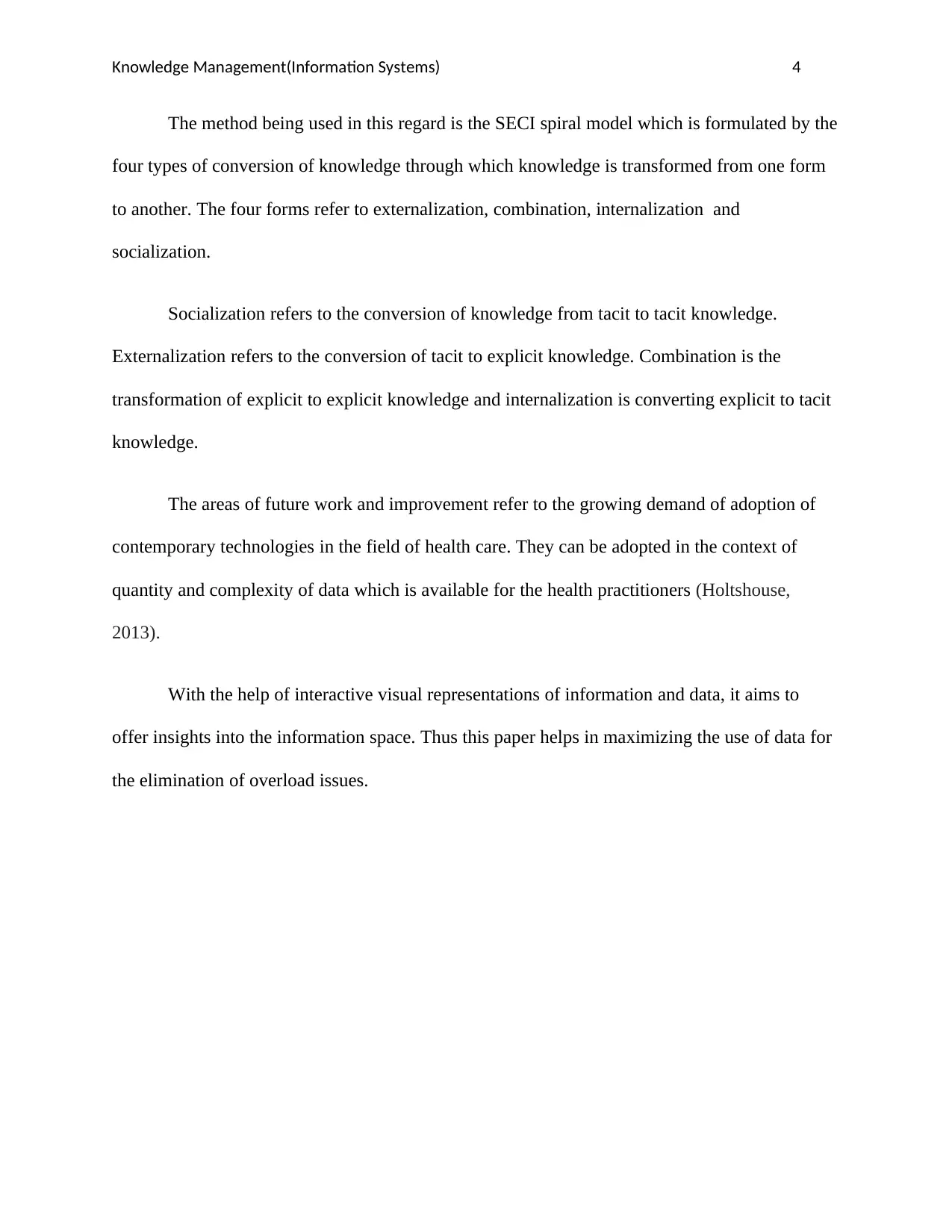
Knowledge Management(Information Systems) 4
The method being used in this regard is the SECI spiral model which is formulated by the
four types of conversion of knowledge through which knowledge is transformed from one form
to another. The four forms refer to externalization, combination, internalization and
socialization.
Socialization refers to the conversion of knowledge from tacit to tacit knowledge.
Externalization refers to the conversion of tacit to explicit knowledge. Combination is the
transformation of explicit to explicit knowledge and internalization is converting explicit to tacit
knowledge.
The areas of future work and improvement refer to the growing demand of adoption of
contemporary technologies in the field of health care. They can be adopted in the context of
quantity and complexity of data which is available for the health practitioners (Holtshouse,
2013).
With the help of interactive visual representations of information and data, it aims to
offer insights into the information space. Thus this paper helps in maximizing the use of data for
the elimination of overload issues.
The method being used in this regard is the SECI spiral model which is formulated by the
four types of conversion of knowledge through which knowledge is transformed from one form
to another. The four forms refer to externalization, combination, internalization and
socialization.
Socialization refers to the conversion of knowledge from tacit to tacit knowledge.
Externalization refers to the conversion of tacit to explicit knowledge. Combination is the
transformation of explicit to explicit knowledge and internalization is converting explicit to tacit
knowledge.
The areas of future work and improvement refer to the growing demand of adoption of
contemporary technologies in the field of health care. They can be adopted in the context of
quantity and complexity of data which is available for the health practitioners (Holtshouse,
2013).
With the help of interactive visual representations of information and data, it aims to
offer insights into the information space. Thus this paper helps in maximizing the use of data for
the elimination of overload issues.
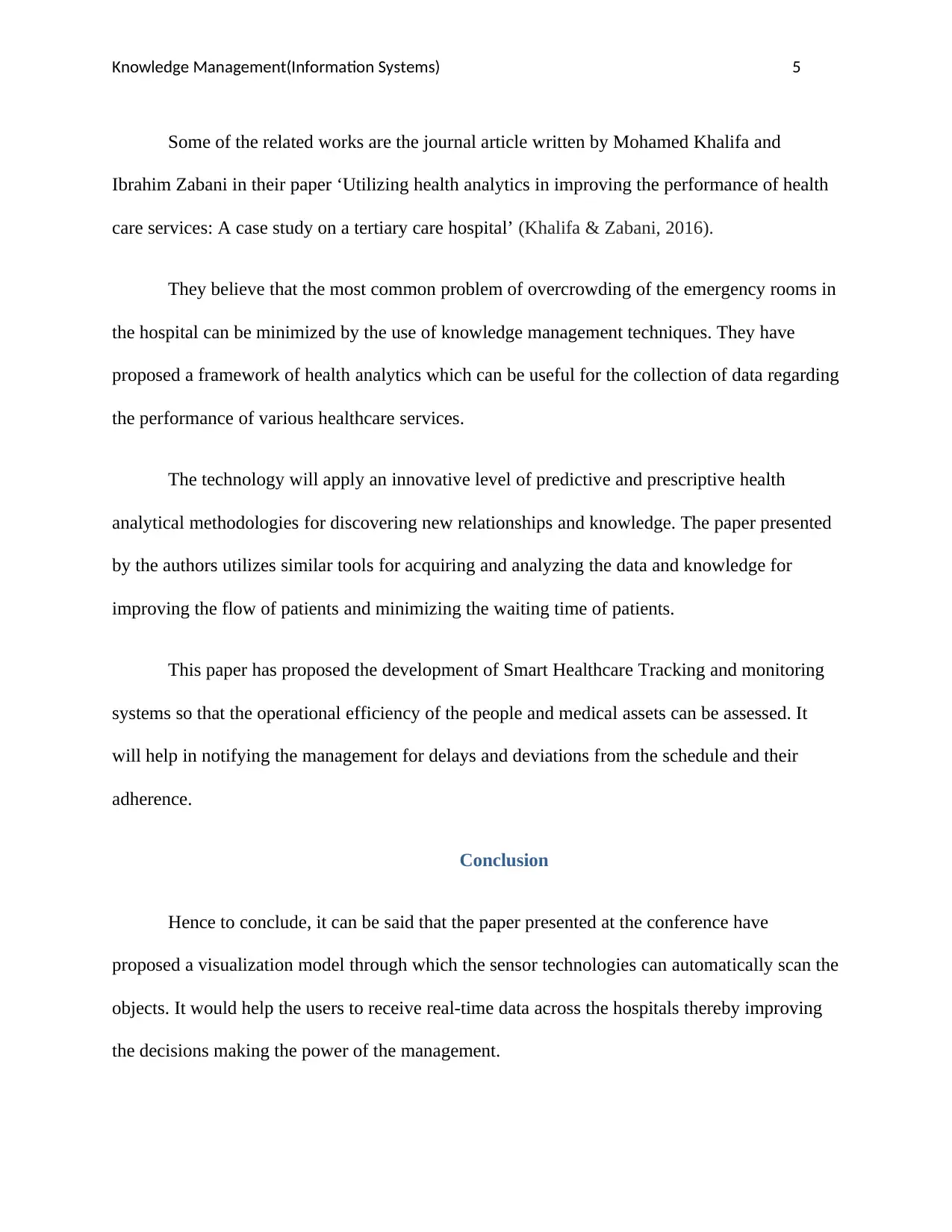
Knowledge Management(Information Systems) 5
Some of the related works are the journal article written by Mohamed Khalifa and
Ibrahim Zabani in their paper ‘Utilizing health analytics in improving the performance of health
care services: A case study on a tertiary care hospital’ (Khalifa & Zabani, 2016).
They believe that the most common problem of overcrowding of the emergency rooms in
the hospital can be minimized by the use of knowledge management techniques. They have
proposed a framework of health analytics which can be useful for the collection of data regarding
the performance of various healthcare services.
The technology will apply an innovative level of predictive and prescriptive health
analytical methodologies for discovering new relationships and knowledge. The paper presented
by the authors utilizes similar tools for acquiring and analyzing the data and knowledge for
improving the flow of patients and minimizing the waiting time of patients.
This paper has proposed the development of Smart Healthcare Tracking and monitoring
systems so that the operational efficiency of the people and medical assets can be assessed. It
will help in notifying the management for delays and deviations from the schedule and their
adherence.
Conclusion
Hence to conclude, it can be said that the paper presented at the conference have
proposed a visualization model through which the sensor technologies can automatically scan the
objects. It would help the users to receive real-time data across the hospitals thereby improving
the decisions making the power of the management.
Some of the related works are the journal article written by Mohamed Khalifa and
Ibrahim Zabani in their paper ‘Utilizing health analytics in improving the performance of health
care services: A case study on a tertiary care hospital’ (Khalifa & Zabani, 2016).
They believe that the most common problem of overcrowding of the emergency rooms in
the hospital can be minimized by the use of knowledge management techniques. They have
proposed a framework of health analytics which can be useful for the collection of data regarding
the performance of various healthcare services.
The technology will apply an innovative level of predictive and prescriptive health
analytical methodologies for discovering new relationships and knowledge. The paper presented
by the authors utilizes similar tools for acquiring and analyzing the data and knowledge for
improving the flow of patients and minimizing the waiting time of patients.
This paper has proposed the development of Smart Healthcare Tracking and monitoring
systems so that the operational efficiency of the people and medical assets can be assessed. It
will help in notifying the management for delays and deviations from the schedule and their
adherence.
Conclusion
Hence to conclude, it can be said that the paper presented at the conference have
proposed a visualization model through which the sensor technologies can automatically scan the
objects. It would help the users to receive real-time data across the hospitals thereby improving
the decisions making the power of the management.
⊘ This is a preview!⊘
Do you want full access?
Subscribe today to unlock all pages.

Trusted by 1+ million students worldwide
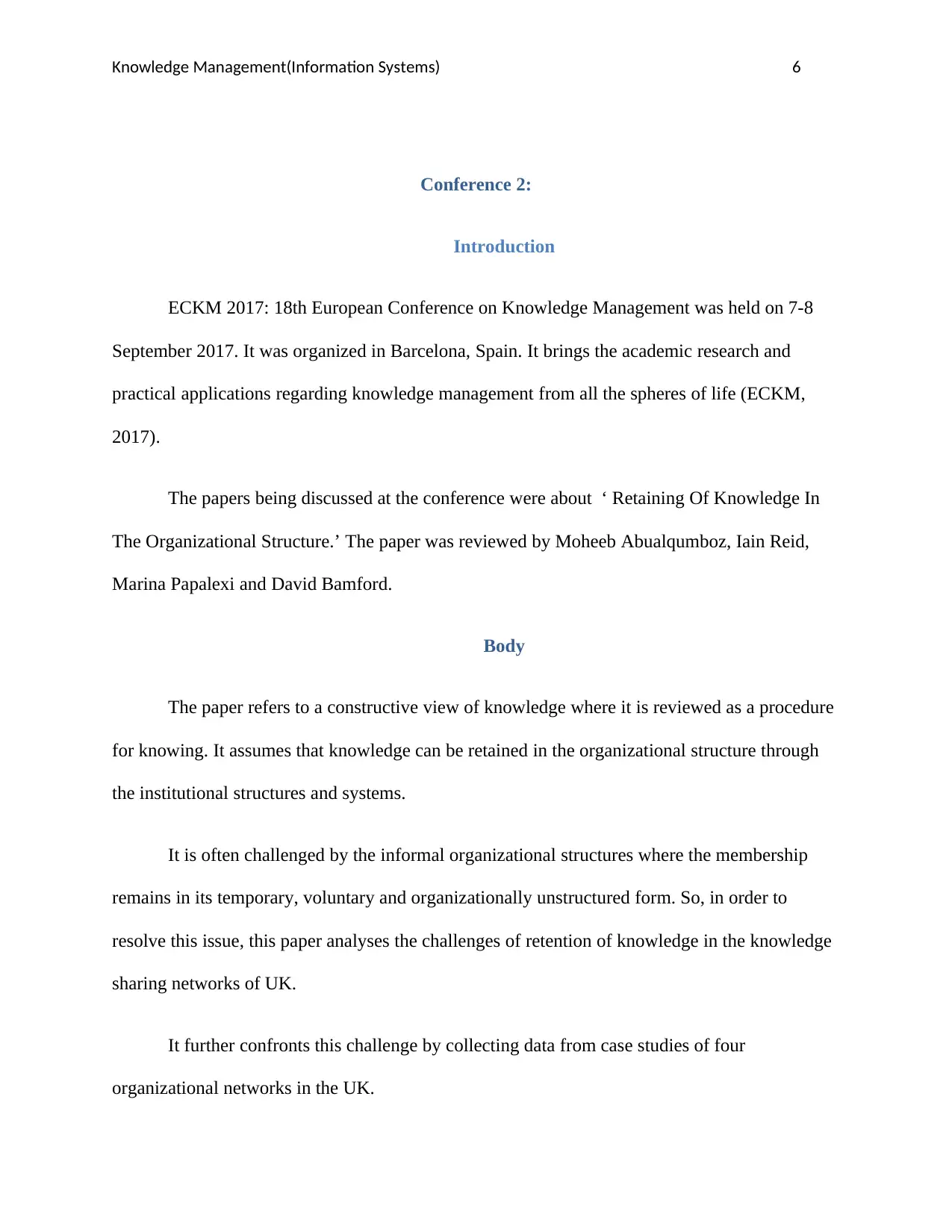
Knowledge Management(Information Systems) 6
Conference 2:
Introduction
ECKM 2017: 18th European Conference on Knowledge Management was held on 7-8
September 2017. It was organized in Barcelona, Spain. It brings the academic research and
practical applications regarding knowledge management from all the spheres of life (ECKM,
2017).
The papers being discussed at the conference were about ‘ Retaining Of Knowledge In
The Organizational Structure.’ The paper was reviewed by Moheeb Abualqumboz, Iain Reid,
Marina Papalexi and David Bamford.
Body
The paper refers to a constructive view of knowledge where it is reviewed as a procedure
for knowing. It assumes that knowledge can be retained in the organizational structure through
the institutional structures and systems.
It is often challenged by the informal organizational structures where the membership
remains in its temporary, voluntary and organizationally unstructured form. So, in order to
resolve this issue, this paper analyses the challenges of retention of knowledge in the knowledge
sharing networks of UK.
It further confronts this challenge by collecting data from case studies of four
organizational networks in the UK.
Conference 2:
Introduction
ECKM 2017: 18th European Conference on Knowledge Management was held on 7-8
September 2017. It was organized in Barcelona, Spain. It brings the academic research and
practical applications regarding knowledge management from all the spheres of life (ECKM,
2017).
The papers being discussed at the conference were about ‘ Retaining Of Knowledge In
The Organizational Structure.’ The paper was reviewed by Moheeb Abualqumboz, Iain Reid,
Marina Papalexi and David Bamford.
Body
The paper refers to a constructive view of knowledge where it is reviewed as a procedure
for knowing. It assumes that knowledge can be retained in the organizational structure through
the institutional structures and systems.
It is often challenged by the informal organizational structures where the membership
remains in its temporary, voluntary and organizationally unstructured form. So, in order to
resolve this issue, this paper analyses the challenges of retention of knowledge in the knowledge
sharing networks of UK.
It further confronts this challenge by collecting data from case studies of four
organizational networks in the UK.
Paraphrase This Document
Need a fresh take? Get an instant paraphrase of this document with our AI Paraphraser
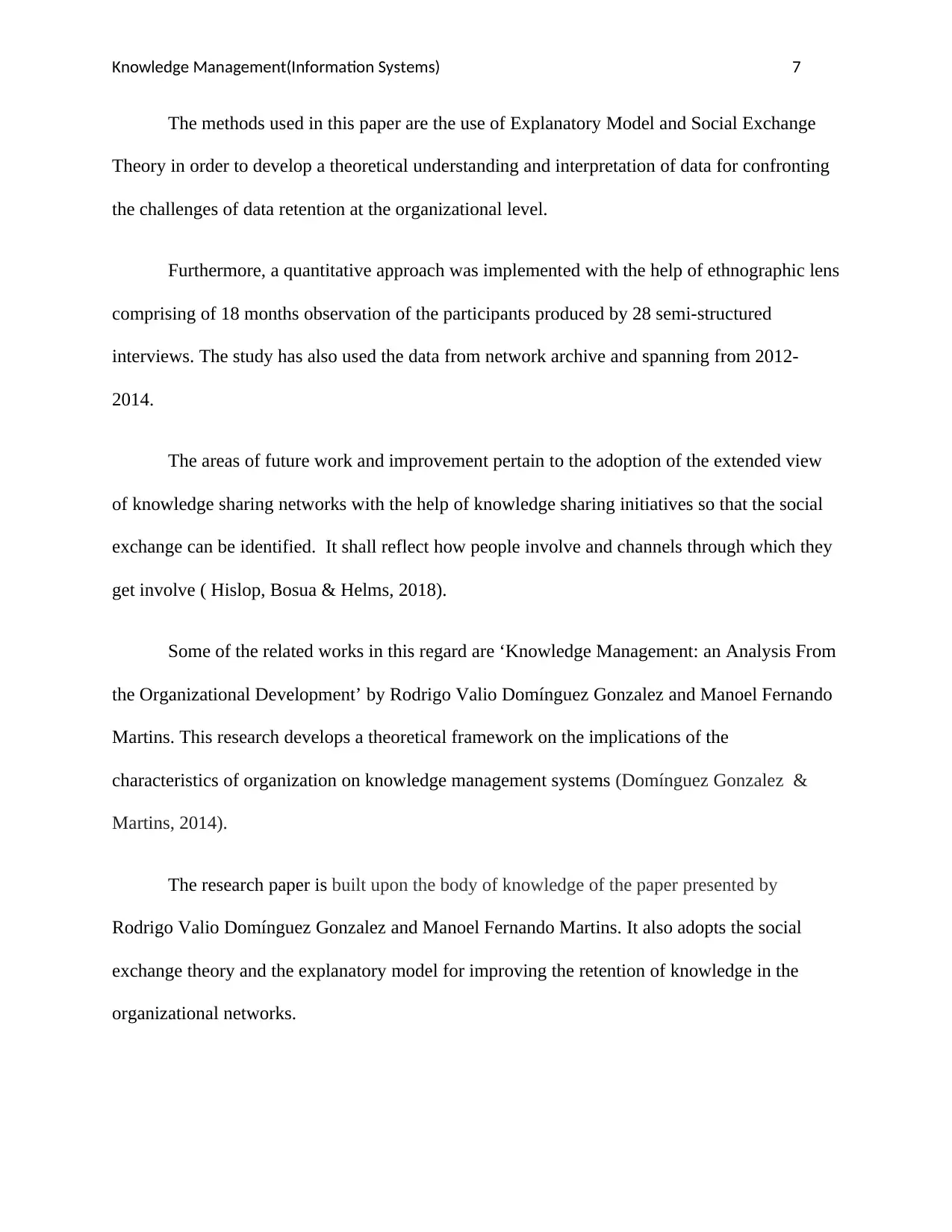
Knowledge Management(Information Systems) 7
The methods used in this paper are the use of Explanatory Model and Social Exchange
Theory in order to develop a theoretical understanding and interpretation of data for confronting
the challenges of data retention at the organizational level.
Furthermore, a quantitative approach was implemented with the help of ethnographic lens
comprising of 18 months observation of the participants produced by 28 semi-structured
interviews. The study has also used the data from network archive and spanning from 2012-
2014.
The areas of future work and improvement pertain to the adoption of the extended view
of knowledge sharing networks with the help of knowledge sharing initiatives so that the social
exchange can be identified. It shall reflect how people involve and channels through which they
get involve ( Hislop, Bosua & Helms, 2018).
Some of the related works in this regard are ‘Knowledge Management: an Analysis From
the Organizational Development’ by Rodrigo Valio Domínguez Gonzalez and Manoel Fernando
Martins. This research develops a theoretical framework on the implications of the
characteristics of organization on knowledge management systems (Domínguez Gonzalez &
Martins, 2014).
The research paper is built upon the body of knowledge of the paper presented by
Rodrigo Valio Domínguez Gonzalez and Manoel Fernando Martins. It also adopts the social
exchange theory and the explanatory model for improving the retention of knowledge in the
organizational networks.
The methods used in this paper are the use of Explanatory Model and Social Exchange
Theory in order to develop a theoretical understanding and interpretation of data for confronting
the challenges of data retention at the organizational level.
Furthermore, a quantitative approach was implemented with the help of ethnographic lens
comprising of 18 months observation of the participants produced by 28 semi-structured
interviews. The study has also used the data from network archive and spanning from 2012-
2014.
The areas of future work and improvement pertain to the adoption of the extended view
of knowledge sharing networks with the help of knowledge sharing initiatives so that the social
exchange can be identified. It shall reflect how people involve and channels through which they
get involve ( Hislop, Bosua & Helms, 2018).
Some of the related works in this regard are ‘Knowledge Management: an Analysis From
the Organizational Development’ by Rodrigo Valio Domínguez Gonzalez and Manoel Fernando
Martins. This research develops a theoretical framework on the implications of the
characteristics of organization on knowledge management systems (Domínguez Gonzalez &
Martins, 2014).
The research paper is built upon the body of knowledge of the paper presented by
Rodrigo Valio Domínguez Gonzalez and Manoel Fernando Martins. It also adopts the social
exchange theory and the explanatory model for improving the retention of knowledge in the
organizational networks.
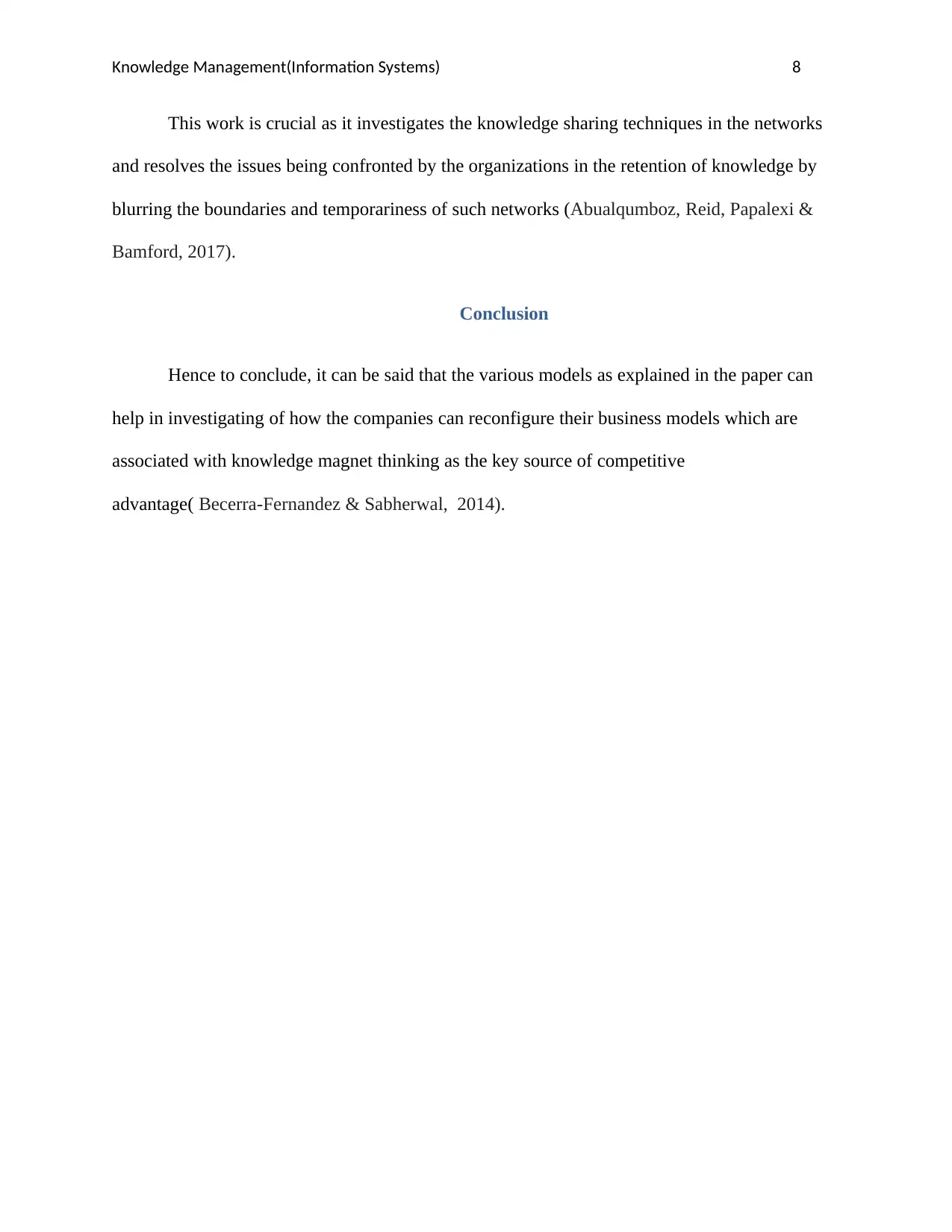
Knowledge Management(Information Systems) 8
This work is crucial as it investigates the knowledge sharing techniques in the networks
and resolves the issues being confronted by the organizations in the retention of knowledge by
blurring the boundaries and temporariness of such networks (Abualqumboz, Reid, Papalexi &
Bamford, 2017).
Conclusion
Hence to conclude, it can be said that the various models as explained in the paper can
help in investigating of how the companies can reconfigure their business models which are
associated with knowledge magnet thinking as the key source of competitive
advantage( Becerra-Fernandez & Sabherwal, 2014).
This work is crucial as it investigates the knowledge sharing techniques in the networks
and resolves the issues being confronted by the organizations in the retention of knowledge by
blurring the boundaries and temporariness of such networks (Abualqumboz, Reid, Papalexi &
Bamford, 2017).
Conclusion
Hence to conclude, it can be said that the various models as explained in the paper can
help in investigating of how the companies can reconfigure their business models which are
associated with knowledge magnet thinking as the key source of competitive
advantage( Becerra-Fernandez & Sabherwal, 2014).
⊘ This is a preview!⊘
Do you want full access?
Subscribe today to unlock all pages.

Trusted by 1+ million students worldwide
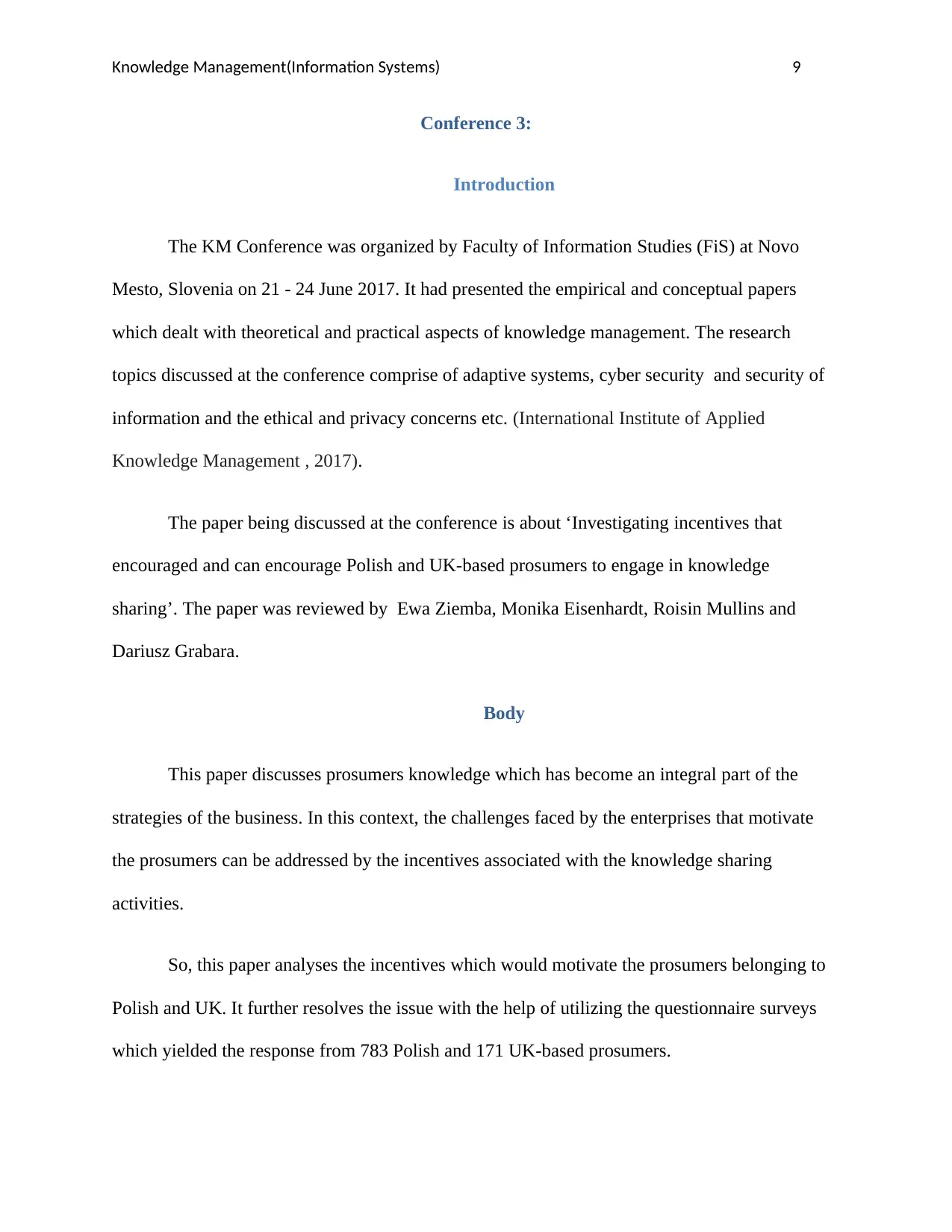
Knowledge Management(Information Systems) 9
Conference 3:
Introduction
The KM Conference was organized by Faculty of Information Studies (FiS) at Novo
Mesto, Slovenia on 21 - 24 June 2017. It had presented the empirical and conceptual papers
which dealt with theoretical and practical aspects of knowledge management. The research
topics discussed at the conference comprise of adaptive systems, cyber security and security of
information and the ethical and privacy concerns etc. (International Institute of Applied
Knowledge Management , 2017).
The paper being discussed at the conference is about ‘Investigating incentives that
encouraged and can encourage Polish and UK-based prosumers to engage in knowledge
sharing’. The paper was reviewed by Ewa Ziemba, Monika Eisenhardt, Roisin Mullins and
Dariusz Grabara.
Body
This paper discusses prosumers knowledge which has become an integral part of the
strategies of the business. In this context, the challenges faced by the enterprises that motivate
the prosumers can be addressed by the incentives associated with the knowledge sharing
activities.
So, this paper analyses the incentives which would motivate the prosumers belonging to
Polish and UK. It further resolves the issue with the help of utilizing the questionnaire surveys
which yielded the response from 783 Polish and 171 UK-based prosumers.
Conference 3:
Introduction
The KM Conference was organized by Faculty of Information Studies (FiS) at Novo
Mesto, Slovenia on 21 - 24 June 2017. It had presented the empirical and conceptual papers
which dealt with theoretical and practical aspects of knowledge management. The research
topics discussed at the conference comprise of adaptive systems, cyber security and security of
information and the ethical and privacy concerns etc. (International Institute of Applied
Knowledge Management , 2017).
The paper being discussed at the conference is about ‘Investigating incentives that
encouraged and can encourage Polish and UK-based prosumers to engage in knowledge
sharing’. The paper was reviewed by Ewa Ziemba, Monika Eisenhardt, Roisin Mullins and
Dariusz Grabara.
Body
This paper discusses prosumers knowledge which has become an integral part of the
strategies of the business. In this context, the challenges faced by the enterprises that motivate
the prosumers can be addressed by the incentives associated with the knowledge sharing
activities.
So, this paper analyses the incentives which would motivate the prosumers belonging to
Polish and UK. It further resolves the issue with the help of utilizing the questionnaire surveys
which yielded the response from 783 Polish and 171 UK-based prosumers.
Paraphrase This Document
Need a fresh take? Get an instant paraphrase of this document with our AI Paraphraser
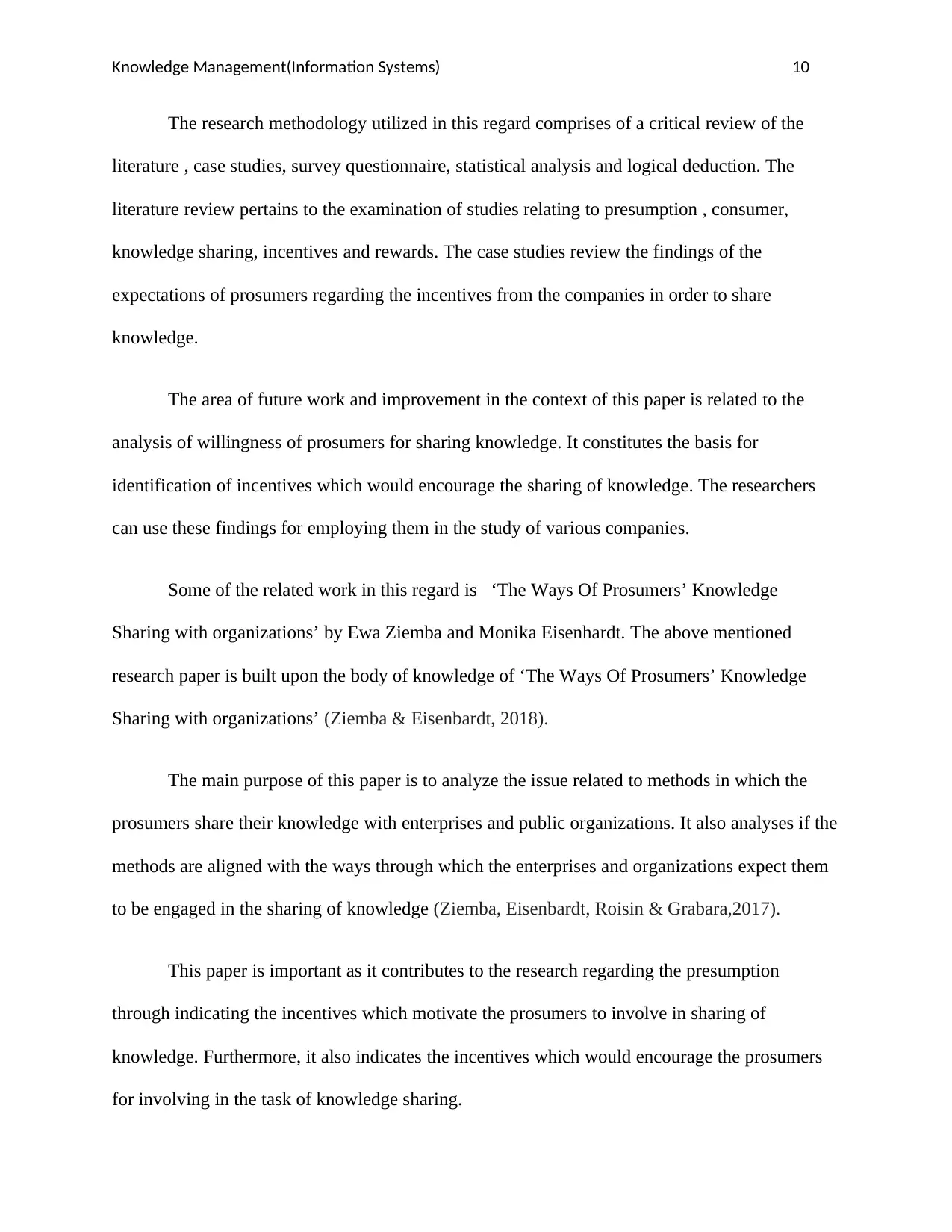
Knowledge Management(Information Systems) 10
The research methodology utilized in this regard comprises of a critical review of the
literature , case studies, survey questionnaire, statistical analysis and logical deduction. The
literature review pertains to the examination of studies relating to presumption , consumer,
knowledge sharing, incentives and rewards. The case studies review the findings of the
expectations of prosumers regarding the incentives from the companies in order to share
knowledge.
The area of future work and improvement in the context of this paper is related to the
analysis of willingness of prosumers for sharing knowledge. It constitutes the basis for
identification of incentives which would encourage the sharing of knowledge. The researchers
can use these findings for employing them in the study of various companies.
Some of the related work in this regard is ‘The Ways Of Prosumers’ Knowledge
Sharing with organizations’ by Ewa Ziemba and Monika Eisenhardt. The above mentioned
research paper is built upon the body of knowledge of ‘The Ways Of Prosumers’ Knowledge
Sharing with organizations’ (Ziemba & Eisenbardt, 2018).
The main purpose of this paper is to analyze the issue related to methods in which the
prosumers share their knowledge with enterprises and public organizations. It also analyses if the
methods are aligned with the ways through which the enterprises and organizations expect them
to be engaged in the sharing of knowledge (Ziemba, Eisenbardt, Roisin & Grabara,2017).
This paper is important as it contributes to the research regarding the presumption
through indicating the incentives which motivate the prosumers to involve in sharing of
knowledge. Furthermore, it also indicates the incentives which would encourage the prosumers
for involving in the task of knowledge sharing.
The research methodology utilized in this regard comprises of a critical review of the
literature , case studies, survey questionnaire, statistical analysis and logical deduction. The
literature review pertains to the examination of studies relating to presumption , consumer,
knowledge sharing, incentives and rewards. The case studies review the findings of the
expectations of prosumers regarding the incentives from the companies in order to share
knowledge.
The area of future work and improvement in the context of this paper is related to the
analysis of willingness of prosumers for sharing knowledge. It constitutes the basis for
identification of incentives which would encourage the sharing of knowledge. The researchers
can use these findings for employing them in the study of various companies.
Some of the related work in this regard is ‘The Ways Of Prosumers’ Knowledge
Sharing with organizations’ by Ewa Ziemba and Monika Eisenhardt. The above mentioned
research paper is built upon the body of knowledge of ‘The Ways Of Prosumers’ Knowledge
Sharing with organizations’ (Ziemba & Eisenbardt, 2018).
The main purpose of this paper is to analyze the issue related to methods in which the
prosumers share their knowledge with enterprises and public organizations. It also analyses if the
methods are aligned with the ways through which the enterprises and organizations expect them
to be engaged in the sharing of knowledge (Ziemba, Eisenbardt, Roisin & Grabara,2017).
This paper is important as it contributes to the research regarding the presumption
through indicating the incentives which motivate the prosumers to involve in sharing of
knowledge. Furthermore, it also indicates the incentives which would encourage the prosumers
for involving in the task of knowledge sharing.
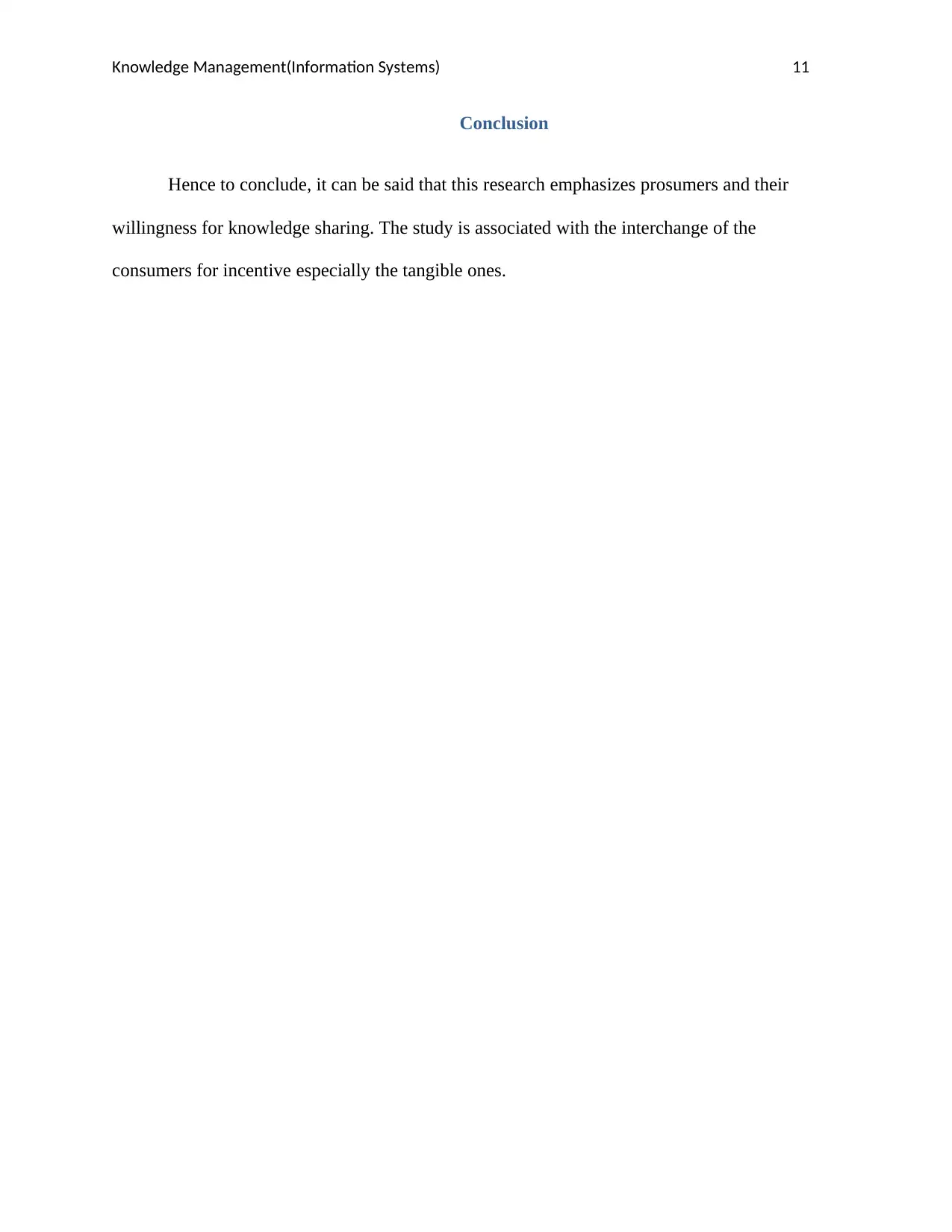
Knowledge Management(Information Systems) 11
Conclusion
Hence to conclude, it can be said that this research emphasizes prosumers and their
willingness for knowledge sharing. The study is associated with the interchange of the
consumers for incentive especially the tangible ones.
Conclusion
Hence to conclude, it can be said that this research emphasizes prosumers and their
willingness for knowledge sharing. The study is associated with the interchange of the
consumers for incentive especially the tangible ones.
⊘ This is a preview!⊘
Do you want full access?
Subscribe today to unlock all pages.

Trusted by 1+ million students worldwide
1 out of 14
Related Documents
Your All-in-One AI-Powered Toolkit for Academic Success.
+13062052269
info@desklib.com
Available 24*7 on WhatsApp / Email
![[object Object]](/_next/static/media/star-bottom.7253800d.svg)
Unlock your academic potential
Copyright © 2020–2026 A2Z Services. All Rights Reserved. Developed and managed by ZUCOL.





